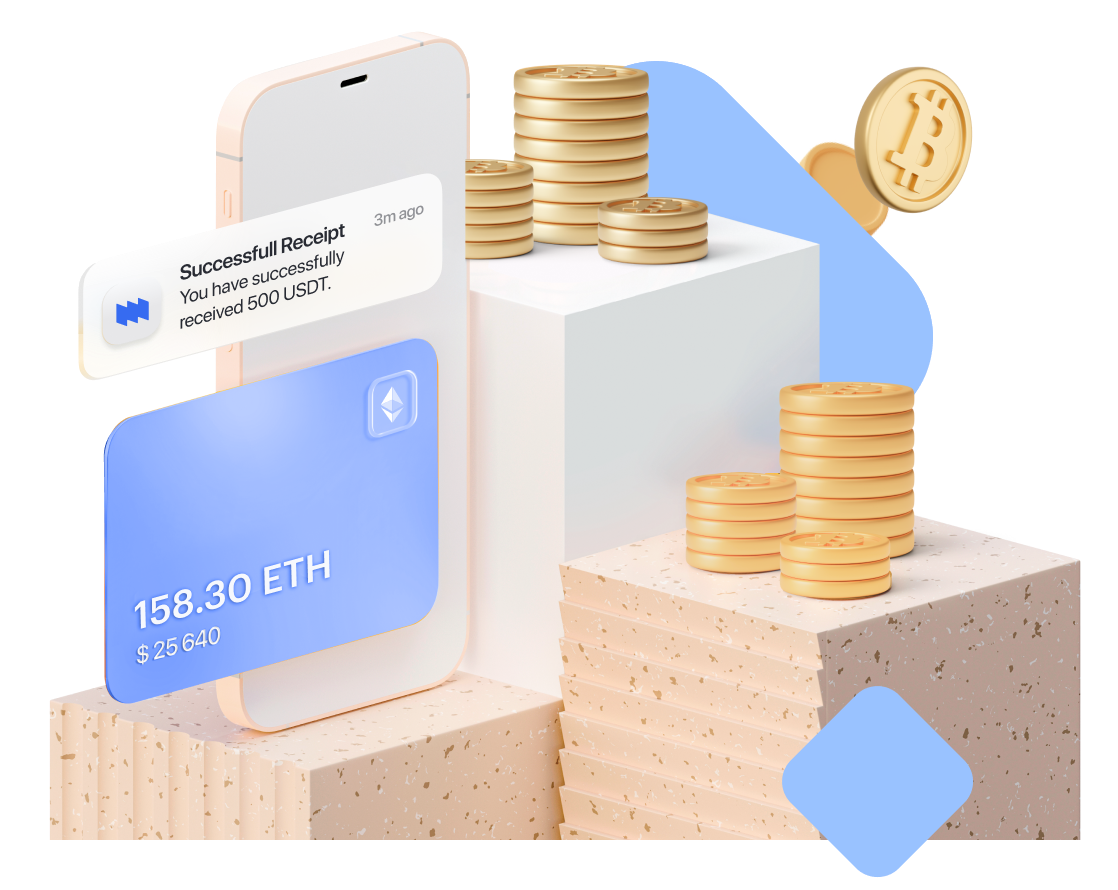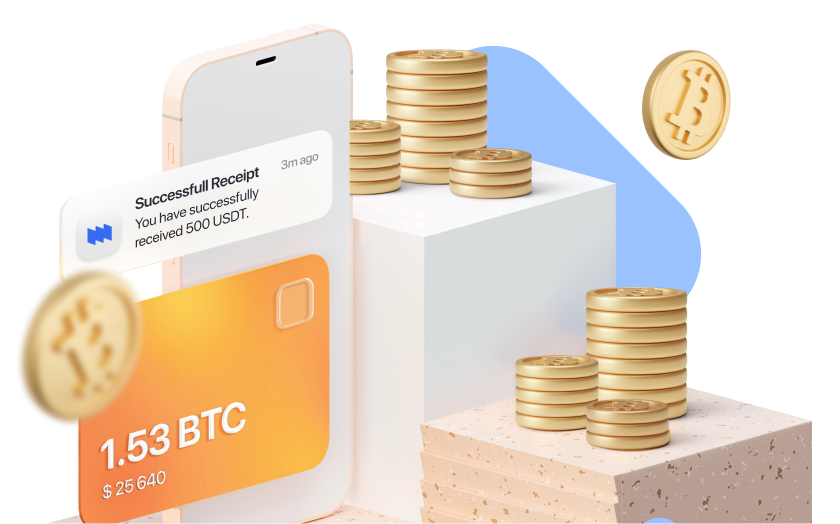Staking Crypto
Notum is the best place to stake and get staking rewards with a skyrocket APY of 155%! Stake right in the wallet and benefit by simply staking your coins.

Staking Calculator: Calculate Your Crypto Staking Rewards
Use the calculator to count how much you will earn by staking with Notum. Don’t lose the chance to earn passive income — make your crypto work and grow for you.
Where to Buy and Store Ethereum?
Why buy crypto via Notum
Buy Ethereum (ETH) With a Credit Card
Easily get Ethereum (ETH) with Visa or MasterCard in Notum. We offer one of the best rates for any ETH operation.
Explore
Why Stake Crypto with Notum
Wide Choice of Crypto
All the world's leading cryptocurrencies, including BTC, ETH, BCH, and 250+, are available. Swap your crypto to over 100k+ crypto assets.

Flexible Payment Methods
Pay with a credit card, a payment app, a bank account, or even with a prepaid card. Choose the most convenient way for you!

Explore Ethereum (ETH) in Notum
Click to find out more about Ethereum ETH. This information will help you make better investment decisions and thus boost your income.
Learn More

Related assets
Nothing found
FAQ
What is staking?
Staking is the process of locking your crypto assets into a protocol that not only helps to secure the network or smart contracts but also generates passive income. Staking uses a Proof-of-stake mechanism, which means that transaction verification is required to place your crypto assets.
Since staking involves locking up assets, you will not be able to trade, sell or transfer your cryptocurrency during the lockup period. In addition, "many protocols, such as the famous PoS, have penalties for withdrawing funds before the end of the staking period." - Notum.What are the risks of staking crypto?
Like any investment, staking comes with certain risks:
- Volatility. This is the most important factor to consider, as an asset locked up for the duration of staking can change the price.
- Liquidity. If you decide to stake an asset that does not have liquidity on exchanges, it will be difficult for you to convert or sell it.
- Lockup period. During staking, you cannot withdraw your asset even if its value falls, which can negatively affect your profit. Therefore, you should pay attention to more stable assets or liquid staking.
- Validator risk. A good validator should ensure that there are no glitches in the process, and if the validator node misbehaves, you may face penalties that will also affect your rewards.
- Theft or loss of an asset. If you do not pay due attention to security or lose the keys to your wallet, you can lose assets and profits.
How can you start staking?
Notum offers a simple and user-friendly Staking Crypto page where you can purchase your chosen asset and then click on the “stake” button next to it. After that, you can read the step-by-step instructions. To start staking, you need to select a cryptocurrency, enter the desired amount you want to stake, select a validator, and confirm the amount. After following these simple steps, you will be able to earn passive income from staking.
What cryptocurrencies can you stake?
Now, there are a huge number of coins available for staking in the crypto market. However, before you start, pay attention to the value of the coin, its volatility, relevance, prospects, rewards, and demand in various applications and projects.
The most popular staking coins in 2023 are USDT, USDC, ETH, BNB, SOL, ADA, ATOM, TEZOS, MATIC and others.How does staking work?
If you are familiar with the traditional banking system, it is easy enough for you to understand how staking works. In a bank, investors invest their assets, and the bank lends them to other people at interest, thereby earning and giving back part of the interest to the original investor. Staking works in a similar way, but instead of engaging a third party, users stake their assets in pools and others lend them at interest. All transactions are safe and transparent, and the absence of intermediaries allows investors to receive great rewards.
What is Cold Staking Cryptocurrency?
Cold staking is a type of staking, where locked assets are stored in a so-called cold wallet, which is not connected to the Internet and is more secure for storing coins and tokens.
What is Staking Ethereum?
Ethereum (ETH) is the second most popular cryptocurrency in the world, which can be used to pay for goods and services, receive secured loans, use it to generate passive income, and so on. ETH is one of the most popular staking coins due to its high value, relevance, and demand in many applications and projects.
Now, Ethereum’s official website offers users such staking options as:- Solo staking
- Staking as a service
- Pooled staking
What is a validator?
Validators are the nodes in the blockchain system that are responsible for the health of the network and distribute the reward for participating in staking. Thus, a validator is a participant in the PoS blockchain that verifies transactions and maintains the security of the blockchain, which is achieved through the staking of crypto assets.
Who can stake on NOTUM?
Any user who has access to the Notum platform can purchase or stake cryptocurrency. The platform offers many crypto assets, fast payments, and best rates.
When will I receive my staking rewards?
Receiving rewards for staking will depend directly on the asset you stake. While rewards for some assets are awarded once a month, others can be paid daily.
How do I unstake my crypto?
Unstaking also depends on the blocking period and the asset you choose. If you have chosen traditional staking, then your asset will have a lockup period during which you cannot withdraw, sell, or transfer cryptocurrency. If you withdraw an asset before the end of the lockup period, you will most likely face penalties and fees. If you have chosen liquid staking, then you can unstake your crypto at any time.